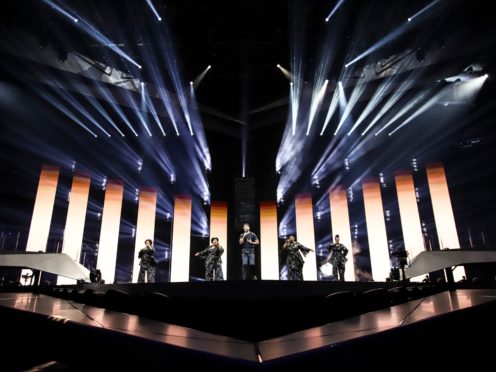Sweden’s Eurovision Song Contest entry made an emotive semi-final debut as John Lundvik performed his gospel-tinged track Too Late For Love to the loudest cheers of the night.
The former professional sprinter sang against a backdrop of hazy lighting before being joined by backing singers for the chorus.
🇸🇪 No @JohnLundvik, it isn't Too Late For Love because we love you!#DareToDream #Eurovision #SWE pic.twitter.com/egFJc4RRpl
— Eurovision (@Eurovision) May 16, 2019
Too Late For Love has earned plaudits among Eurovision fans and members of the press in Tel Aviv, with Lundvik a favourite to win the contest outright.
The 36-year-old is also one of the writers of Bigger Than Us, the song UK entry Michael Rice will sing in the grand final on Saturday.
Speaking after his semi-final performance, he praised 21-year-old Rice as “an amazing guy” but said he had kept Too Late For Love to himself because it was “the greatest song I have ever written”.
Lundvik has also penned music for US hip hop show Empire and co-wrote the official song for the wedding of Swedish royalty Victoria, Crown Princess of Sweden, and Daniel Westling in 2010.
🇮🇪 Strong retro vibes from @Sarah_McTernan and her song 22 for Ireland.#DareToDream #Eurovision #IRL pic.twitter.com/tcaEVnJmY1
— Eurovision (@Eurovision) May 16, 2019
Earlier in the night Ireland’s Sarah McTernan kicked off proceedings, performing the upbeat pop song 22 at the Expo Tel Aviv venue, flanked by two backing singers dressed in pink.
McTernan, 25, was second to appear after Armenia’s Srbuk sang Walking Out, against a backdrop of pyrotechnics.
McTernan is hoping to change Ireland’s recent fortunes in the contest.
Like the UK, Ireland is a longstanding participant, competing 52 times, but has not won since 1996 with Eimear Quinn’s The Voice.
🇨🇭 @haenni_luca sure got us dirty dancing here in Tel Aviv!#DareToDream #Eurovision #CHE pic.twitter.com/6caSCj8khG
— Eurovision (@Eurovision) May 16, 2019
Moldova’s Anna Odobescu, Switzerland’s Luca Hanni, Austria’s PAENDA and Russia’s Sergey Lazarev were among the earlier acts in the second semi-final, which was the first chance UK residents had to vote in this year’s contest.
All countries taking part in the semi-final can vote, alongside fans in Germany, Italy and the UK.
Conchita will be performing at the Grand Final on Saturday… with some very special guests! We can't wait!#DareToDream #Eurovision pic.twitter.com/KFJEBt7A1e
— Eurovision (@Eurovision) May 16, 2019
Votes can be made over the phone, by text or via the Eurovision app, available on iOS, Android and Windows devices.
The UK, as one of the “big five” countries, along with France, Germany, Italy and Spain, are already assured of a place in the grand final.
Last year’s winners Israel also do not have to qualify via the semi-finals.
